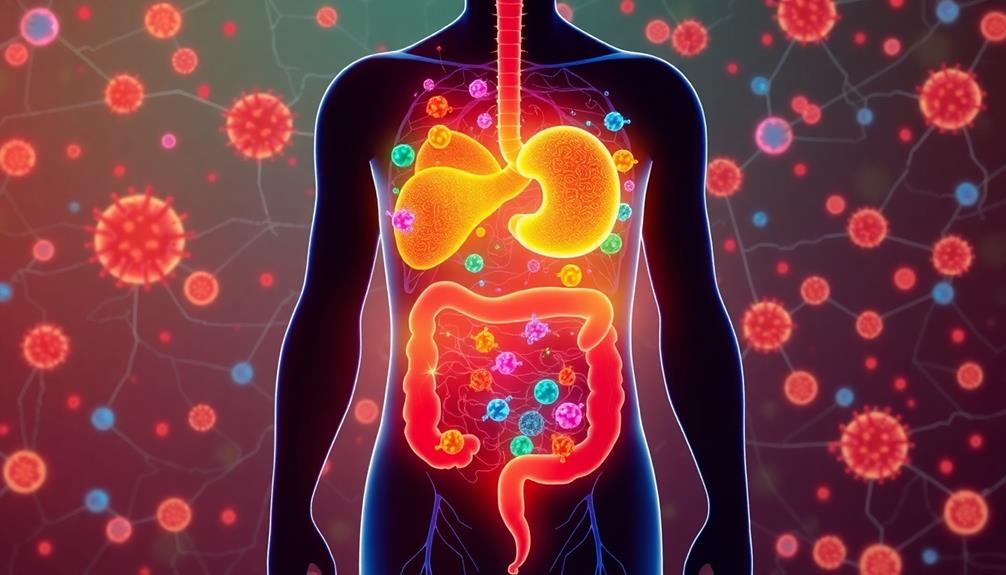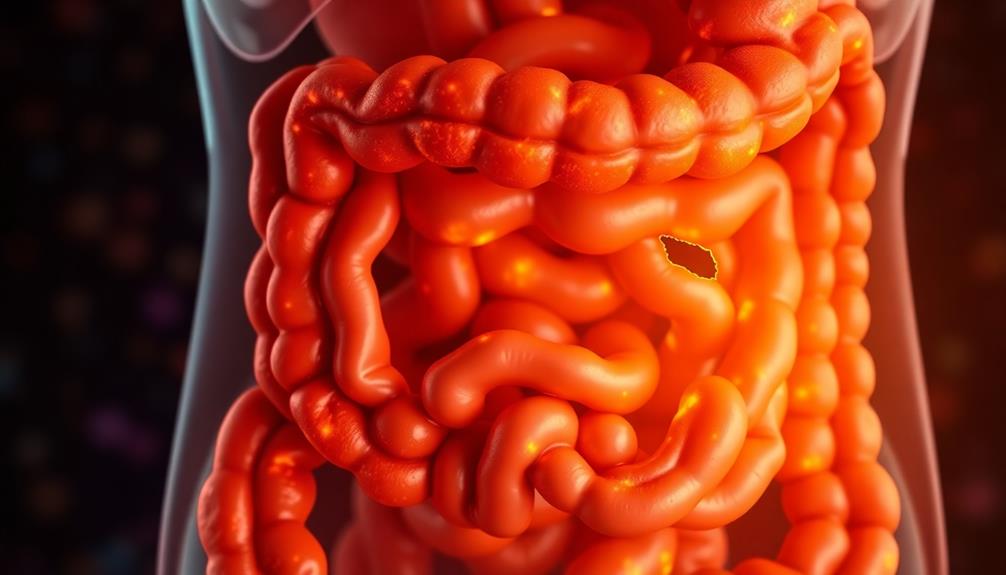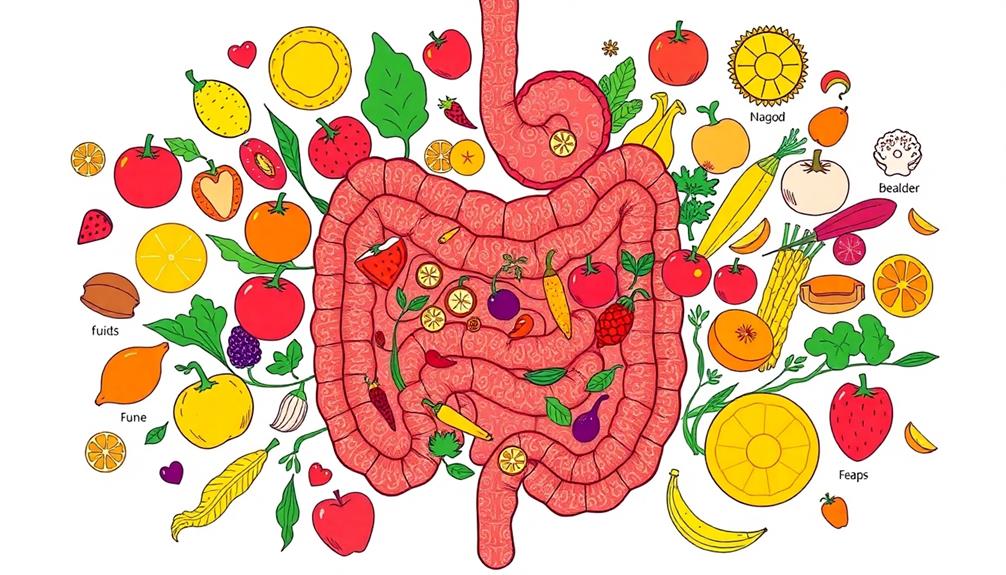Your gut health plays a vital role in your immune system's function. Dysbiosis, or an imbalance of gut bacteria, can increase intestinal permeability, often leading to autoimmune conditions. This means harmful substances can leak into your bloodstream, triggering your immune system to mistakenly attack your body's healthy cells. A balanced diet rich in fiber, probiotics, and prebiotics can help restore gut health and potentially alleviate symptoms of autoimmunity. So, by understanding how your diet impacts gut health, you can take proactive steps to support your immune system and overall well-being. There's much more to explore about this fascinating connection.
Key Takeaways
- The gut microbiome influences immune function, and dysbiosis can lead to autoimmune diseases by increasing intestinal permeability.
- Autoimmune conditions, affecting 5-8% of the population, are linked to genetic and environmental factors, including gut health.
- Leaky gut syndrome allows harmful substances into the bloodstream, exacerbating autoimmune symptoms and chronic inflammation.
- Dietary changes, such as increasing fiber and incorporating prebiotics and probiotics, can restore gut health and alleviate autoimmune symptoms.
- Future research aims to explore personalized dietary interventions and the gut's role in autoimmunity, enhancing treatment strategies.
The Gut Microbiome Explained

The gut microbiome is home to trillions of microorganisms, including bacteria, viruses, fungi, and protozoa, that play an important role in your health. This diverse microbial community primarily resides in your intestines and is fundamental for maintaining intestinal homeostasis and gut health.
A balanced diet, rich in varied nutrients, can help foster a healthy gut microbiome and vegetarian-friendly options like Mushroom Masala are a great addition. The gut microbiome encodes approximately 3.3 million genes, far exceeding your own gene count, which helps with nutrient digestion and metabolic functions.
The establishment of your gut microbiota begins at birth, influenced by factors like the mode of delivery and breastfeeding. These early influences shape your microbiome's composition and can have lasting effects on your immune system.
A balanced gut microbiome, characterized by commensal microbiota, is necessary for an effective immune response. However, dysbiosis—an imbalance in these microbial communities—can disrupt this equilibrium, leading to increased intestinal permeability and contributing to the pathogenesis of autoimmune diseases.
Understanding Autoimmune Conditions

Understanding autoimmune conditions requires recognizing how your immune system can sometimes misfire. These diseases affect about 5-8% of the US population, primarily women. With over 80 different autoimmune disorders, each one occurs when your immune system mistakenly attacks healthy cells.
Factors like genetic predisposition and environmental triggers play important roles, but gut health is increasingly recognized as essential. A balanced diet incorporating fresh, nutrient-dense foods, such as those found in farm-to-table cooking, can support gut health and overall immune function.
Research shows that increased intestinal permeability, often called leaky gut, can exacerbate autoimmune diseases. When your gut health is compromised, harmful substances can enter your bloodstream, triggering immune responses that lead to chronic inflammatory conditions.
The composition of your gut microbiota greatly influences these processes, affecting how your body reacts to potential threats. Regulatory T cells are critical for maintaining balance in your immune system, but when disrupted, they may fail to control these misdirected immune responses.
Understanding these connections emphasizes the importance of developing effective therapeutic strategies. By focusing on improving gut health and restoring a balanced microbiota composition, you may help manage or even prevent the progression of autoimmune conditions.
The Role of Leaky Gut

Leaky gut can greatly impact your health by allowing harmful substances to slip into your bloodstream.
This intestinal barrier dysfunction is often linked to what you eat, as a diet low in fiber and high in processed foods can worsen permeability.
Incorporating fiber-rich foods, such as Chinese Steamed Egg, can help support gut health.
Understanding how these dietary influences affect your gut can be essential in managing autoimmune conditions.
Intestinal Barrier Dysfunction
In recent years, the concept of gut health has gained significant attention, particularly regarding its connection to autoimmune conditions. One key player in this relationship is intestinal barrier dysfunction, often referred to as leaky gut syndrome. When intestinal permeability increases, harmful substances like bacteria and toxins can enter your bloodstream, potentially triggering autoimmune responses.
A healthy gut microbiome is essential, as certain traditional dishes, such as Yekolo (Roasted Barley), can support gut health due to their high fiber content.
Here are some important points to take into account:
- Zonulin Regulation: This protein controls tight junctions in the gut lining; overexpression can worsen permeability.
- Autoimmune Diseases: Conditions like type 1 diabetes, multiple sclerosis, and inflammatory bowel diseases show strong links to leaky gut.
- Dysbiosis: An imbalance in gut microbiota can exacerbate leaky gut, leading to immune dysregulation.
- Inflammation: Increased permeability often results in heightened inflammation, worsening autoimmune symptoms.
- Dietary Interventions: Changes like gluten removal can normalize zonulin levels and help repair intestinal damage.
Understanding intestinal barrier dysfunction is essential for managing autoimmune diseases. By addressing leaky gut and its underlying causes, you can improve your overall gut health and potentially mitigate autoimmune responses.
Dietary Influences on Permeability
The health of your gut can be greatly influenced by what you eat, directly impacting intestinal permeability. Certain dietary influences can either promote or hinder gut health, with high-fat and high-sugar diets linked to increased permeability and dysbiosis in as little as one day.
For instance, traditional Mexican foods like Chilaquiles can provide beneficial ingredients that support gut health when prepared with fresh, whole components. Gluten ingestion is another key factor; it often correlates with higher intestinal permeability due to the overexpression of the zonulin protein, especially in autoimmune patients. Removing gluten from your diet can help normalize this effect.
Additionally, a low dietary fiber intake can starve beneficial gut bacteria, leading to the growth of harmful bacteria and contributing to leaky gut syndrome. Processed foods and additives exacerbate this issue by promoting gastrointestinal inflammation, which further compromises your intestinal barrier's integrity.
On the flip side, incorporating probiotics and prebiotics into your diet can greatly reduce intestinal permeability. These elements enhance the gut environment and promote the growth of beneficial microflora, supporting overall gut health.
Dietary Impacts on Gut Health

Regularly consuming a diet low in dietary fiber can negatively impact your gut health, starving beneficial bacteria and allowing harmful ones to thrive. This imbalance, known as dysbiosis, can lead to inflammation and even increase your risk of autoimmune diseases.
A diverse diet incorporating various ingredients, much like the rich flavors found in Brazilian cuisine, can also contribute to maintaining a healthy gut microbiota.
To maintain a healthy gut microbiota composition, consider the following dietary strategies:
- Increase dietary fiber: Aim for at least 25-30 grams daily from fruits, vegetables, and whole grains.
- Incorporate prebiotics: Foods like garlic, onions, and bananas feed beneficial gut bacteria.
- Limit high-fat and high-sugar foods: These can quickly alter gut microbiota, promoting harmful bacteria.
- Evaluate gluten ingestion: Removing gluten may help normalize zonulin levels and improve gut barrier function.
- Include short-chain fatty acids (SCFAs): Found in fermented foods, SCFAs support intestinal health and protect against leaky gut.
Healing Strategies for Autoimmunity

When it comes to healing autoimmune conditions, dietary changes can make a significant difference.
By focusing on increasing fiber intake and incorporating probiotics and prebiotics, you can support your gut health and reduce inflammation.
Including traditional foods like Umeboshi (Pickled Plum) can also enhance gut health due to their beneficial properties.
These strategies not only help restore gut balance but also improve your overall immune function.
Dietary Interventions for Healing
Recognizing the pivotal role of diet can greatly enhance your gut health and address autoimmune conditions. Traditional Indonesian dishes, such as Kue Putu and Dadar Gulung, often incorporate wholesome ingredients like coconut and rice flour that can contribute to a balanced diet.
By implementing specific dietary interventions, you can improve gut microbiota diversity and alleviate symptoms associated with dysbiosis. Here are some strategies to reflect upon:
- Increase dietary fiber: Aim for 25g for women and 38g for men to support beneficial gut bacteria.
- Incorporate complex carbohydrates: Foods rich in these can help produce short-chain fatty acids (SCFAs) like butyrate, essential for gut barrier function.
- Remove gluten: This can normalize zonulin levels, improving intestinal permeability and potentially easing symptoms of autoimmune diseases.
- Balance macronutrients: A high-protein diet may alter gut microbiota, so aim for a balanced intake to support immune function.
- Utilize prebiotics and probiotics: These can greatly reduce intestinal permeability and enhance overall immune health.
Probiotics and Prebiotics Benefits
Incorporating probiotics and prebiotics into your diet can greatly enhance gut health, especially if you're tackling autoimmune conditions. Probiotics, like Lactobacilli and Bifidobacteria, help restore the balance of beneficial bacteria in your gut, modulating immune responses linked to autoimmune diseases. By improving your gut microbiome, these microorganisms can support your overall well-being.
Additionally, diverse diets rich in traditional foods, such as Muamba De Galinha from Angola, can provide essential nutrients and promote gut health. Prebiotics, such as inulin, play an important role too. They promote the growth of beneficial bacteria, improving gut health and contributing to glucose homeostasis. Together, probiotics and prebiotics can markedly reduce intestinal permeability, which is critical for managing leaky gut—a common issue in autoimmune diseases.
Studies show that introducing probiotics in clinical settings can alleviate symptoms of autoimmune diseases, although individual responses may vary based on your unique microbiome and diet. By maintaining gut barrier function, these beneficial substances help prevent the expansion of harmful bacteria, which can trigger inflammatory responses.
In this way, integrating probiotics and prebiotics into your daily routine can be an effective healing strategy for autoimmunity, promoting a healthier, more resilient gut.
Future Research Directions

As researchers explore deeper into the intricate relationship between gut health and autoimmune conditions, it's clear that future studies must prioritize several key areas. Understanding these connections could lead to innovative approaches in managing autoimmune diseases.
For example, examining how certain Thai street foods rich in probiotics might influence gut microbiota could provide valuable insights.
- Investigate the relationship between leaky gut and exacerbation of autoimmune diseases.
- Identify specific dietary components that impact gut microbiota, paving the way for effective dietary interventions.
- Explore personalized therapeutic strategies based on individual microbiome profiles and genetic predispositions.
- Foster interdisciplinary collaboration between gastroenterology and immunology to better understand the underlying mechanisms.
- Increase funding for research focused on the gut microbiome's role in autoimmunity to develop preventive measures and treatments.
These focal points in future research can greatly enhance our understanding of how gut health influences autoimmune conditions.
By targeting the connections between gut microbiota and autoimmune diseases, researchers can uncover potential preventive measures and therapeutic options tailored to individual needs.
Ultimately, a collaborative approach will deepen our insights into the implications of gut health, paving the way for more effective strategies in managing autoimmune disorders.
Frequently Asked Questions
How Is Your Gut Connected to Autoimmune Diseases?
Your gut's health impacts your immune system. When gut bacteria are imbalanced or the intestinal barrier weakens, harmful substances can enter your bloodstream, potentially triggering autoimmune responses and increasing the risk of various autoimmune diseases.
What Is the Best Diet to Reverse Autoimmune Disease?
To reverse autoimmune diseases, focus on a diet rich in anti-inflammatory foods like fruits, vegetables, and whole grains. Limit processed foods, sugars, and unhealthy fats, and consider probiotics and prebiotics to support your gut health.
Why Is Autoimmune Disease More Common Now?
Autoimmune diseases are more common now due to factors like increased processed food consumption, environmental triggers, and lifestyle changes. These elements interact with genetics, making you more susceptible to developing such conditions over time.
What Is the Hardest Autoimmune Disease to Diagnose?
Imagine facing a puzzle with missing pieces—multiple sclerosis often feels that way. Its relapsing-remitting symptoms confuse many, making it one of the hardest autoimmune diseases to diagnose accurately. You're not alone in this struggle.
Conclusion
In the journey toward better health, remember that "you are what you eat." By nurturing your gut microbiome, you can greatly impact your immune system and potentially reduce the risk of autoimmune conditions. Embracing a balanced diet and exploring healing strategies can pave the way for improved well-being. As research progresses, staying informed will empower you to make choices that support both gut health and overall vigor. Take charge—your gut and immune system will thank you!









